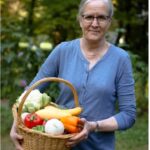 Department of Nutrition, Gillings School of Global Public Health
Department of Nutrition, Gillings School of Global Public Health
Alice Ammerman is the Director of the UNC Center for Health Promotion and Disease Prevention and Professor of Nutrition in the Gillings School of Global Public Health. Her research focuses on design, testing, implementation and dissemination of innovative clinical and community-based nutrition and physical activity interventions for chronic disease risk reduction in low income and minority populations. Her research also addresses the role of sustainable food systems in health, the environment, and economic well-being, emphasizing the social determinants of health, particularly food access and food insecurity…She is the author of more than 120 articles and book chapters.
How did you start doing participatory research?
Inspired by her Aunts? From rural Kentucky who were working in Africa, Dr. Alice Ammerman pursued an undergraduate major in African Studies and minor in cultural anthropology. The Nestle boycott sparked her interest in social justice and nutrition which led her to pursue a Master’s in nutrition. Her community engaged research began by studying cultural differences related to food and chronic disease prevention in lower income communities.
What does participatory research mean to you?
For Dr. Ammerman, the process of participatory research comes naturally in public health. However, even in public health there were times when community engaged work was not recognized because it was not “rigorous and academic enough.” She reflected that it has come a long way now that there are NIH grants that explicitly require the use of CBPR principles. She focuses on “making sure that the research we do goes back to benefit the people,” or in other words, “translating research into practice.”
What are your current participatory projects?
Dr. Ammerman is currently testing a Blue Cross Blue Shield-funded intervention trying to prevent further chronic diseases of people who are food insecure and have high blood pressure. The study provides a box of produce (twice a month), prepared meal (once a month), and coaching from community health workers. It is groundbreaking research by an insurance company recognizing the possibility of cost effectiveness by preventing disease as opposed to covering later medication and clinical care. She is also involved in the Medicaid Transformation Project pilot study in North Carolina where Medicaid dollars will be used to address social determinants of health: housing, transportation, domestic violence, and food insecurity.
Furthermore, she is introducing healthy alternatives to Southern cuisine through the “Med-South diet.” It is an adaptation of Mediterranean diet using common vegetables available in the U.S. South (e.g. collard greens, kale, and sweet potatoes), introducing healthy recipes while using what is available and familiar. She recommends the use of nuts, healthy oils, whole grains, and fewer processed carbohydrate foods. She has already succeeded in making healthy and tasty BBQ, as well as hush puppies using whole grain, vegetables and nuts; coming next are healthy biscuits!
“Everything works much better when you really engage the community in the process, so that you are addressing an issue that they care about and that they’re engaged in wanting to solve.” Then it’s important to share what is learned with community partners and use the information to address the original concern”